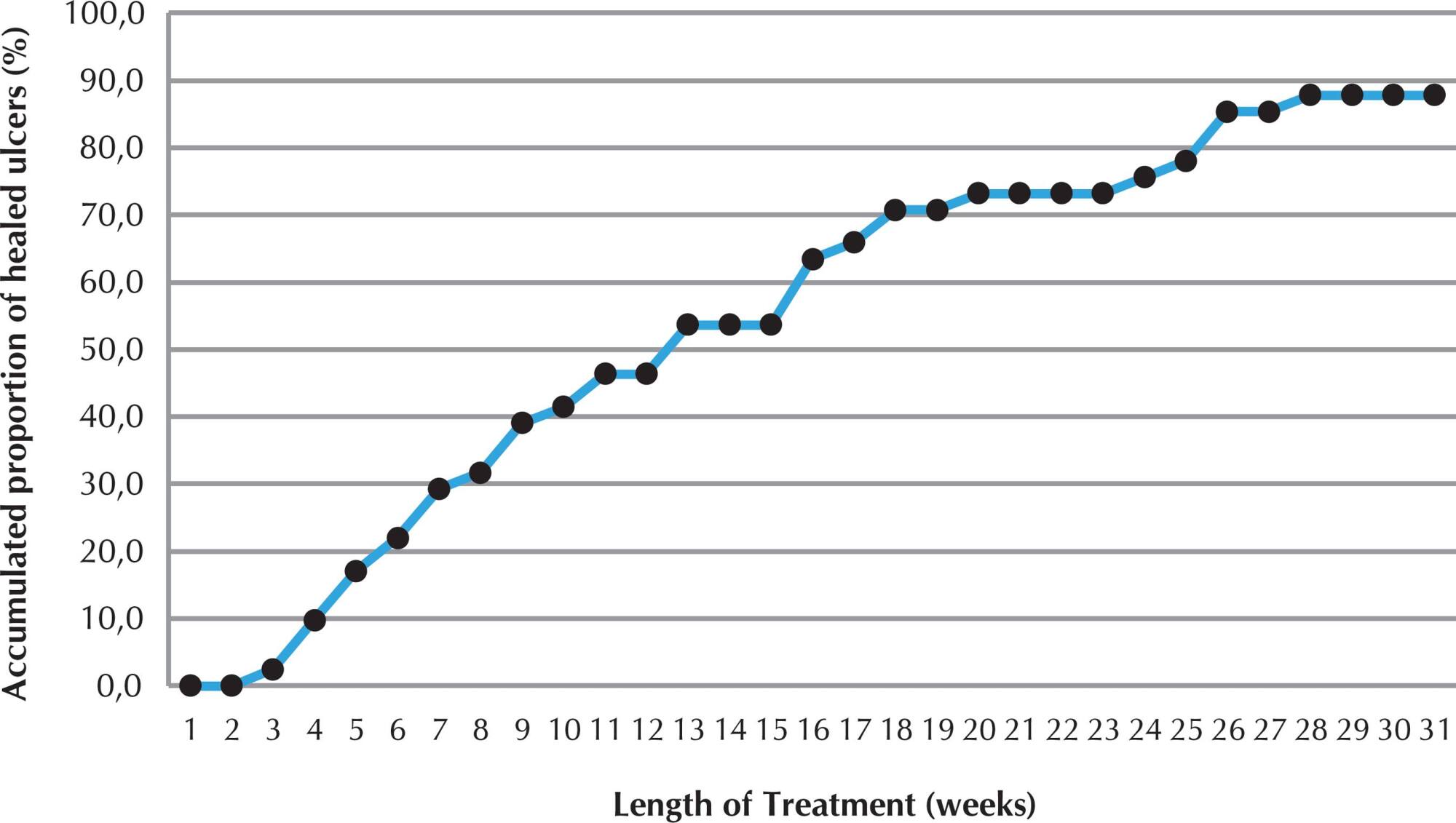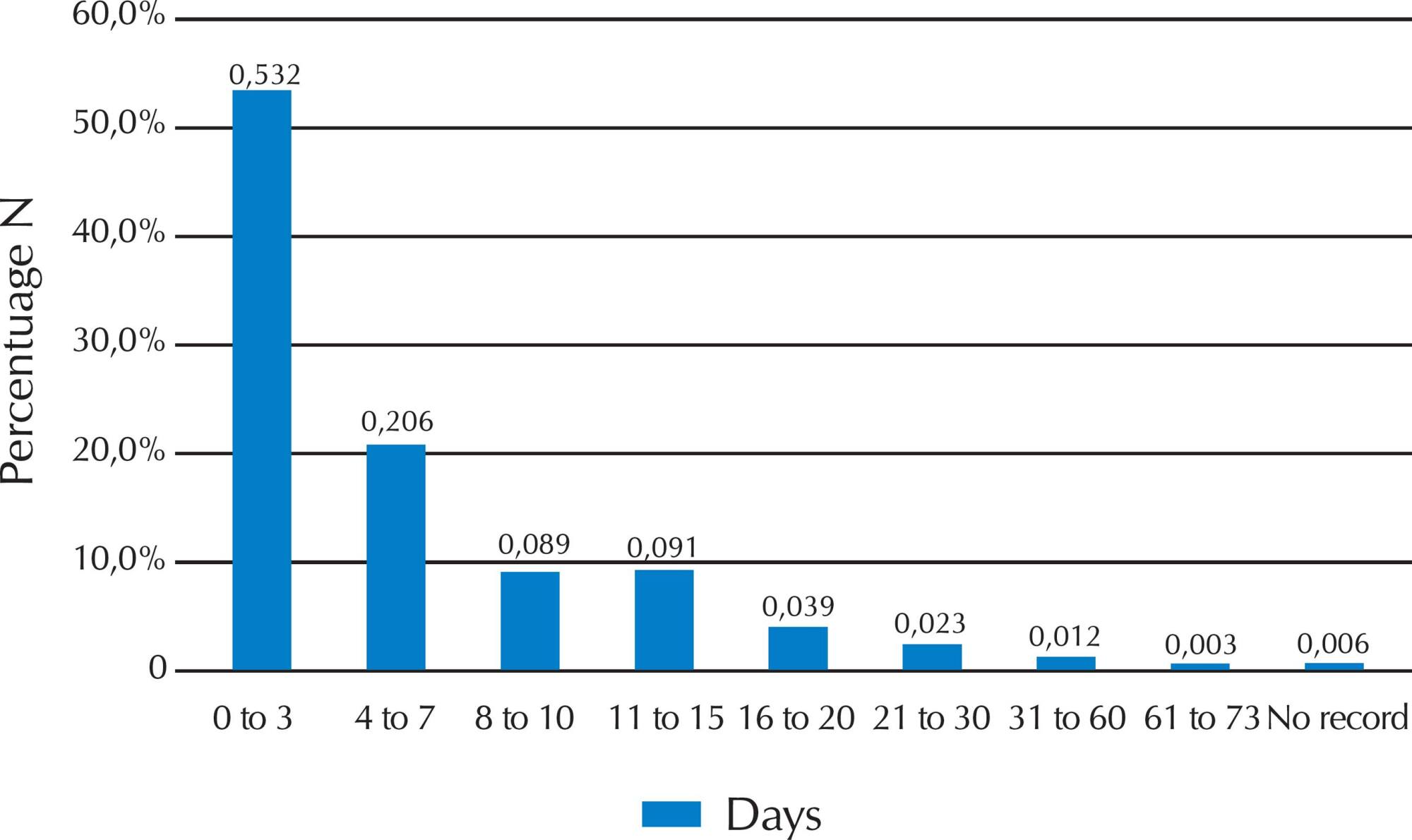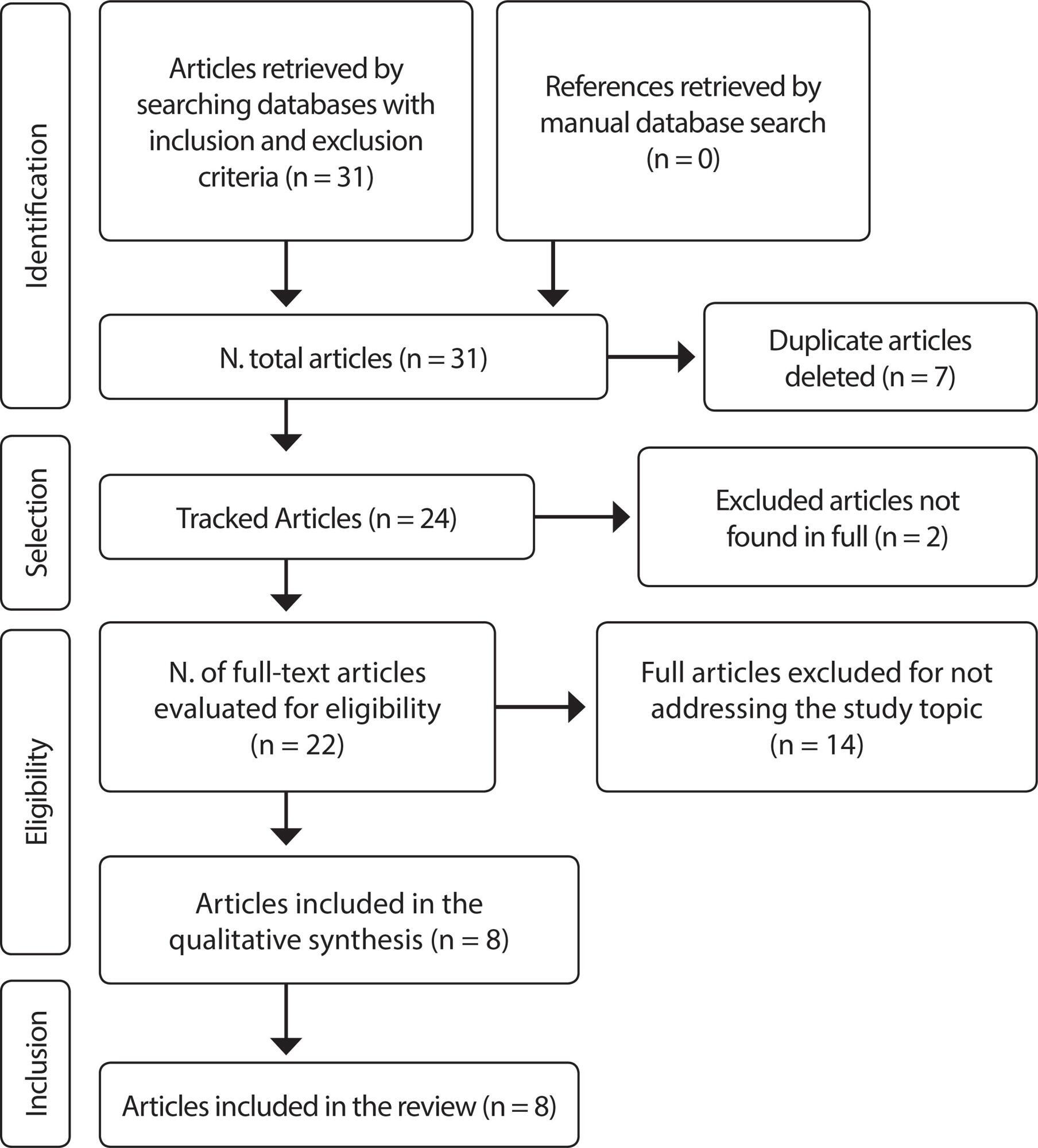-
01-01-2016
Pressure ulcer healing with Plenusdermax® Calendula officinalis L. extract
Revista Brasileira de Enfermagem. 2016;69(2):250-257
Abstract
Pressure ulcer healing with Plenusdermax® Calendula officinalis L. extract
Revista Brasileira de Enfermagem. 2016;69(2):250-257
DOI 10.1590/0034-7167.2016690207i
Views0See moreABSTRACT
Objective:
to evaluate the therapeutic benefits of the bioactive extracts of Plenusdermax®Calendula officinalis for pressure ulcer healing.
Method:
an observational cohort study, including 41 patients with a diagnosis of pressure ulcer that was stable in size for more than three months. Patients were evaluated every two weeks, over 30 weeks, for: reduction of the wound area, infection control, types of tissue and exudate, and ulcer microbiology.
Results:
the proportions of patients who were completely healed after 15 and 30 weeks of treatment were 63% and 88%, respectively, and the mean healing time was 12.5±7.8 weeks. No adverse events were observed during treatment.
Conclusion:
the results of the study indicate that bioactive C. officinalis Plenusdermax® is a safe treatment that promotes healing of pressure ulcers.

-
01-01-2016
Quality of life assessment for health promotion groups
Revista Brasileira de Enfermagem. 2016;69(2):242-249
Abstract
Quality of life assessment for health promotion groups
Revista Brasileira de Enfermagem. 2016;69(2):242-249
DOI 10.1590/0034-7167.2016690206i
Views0See moreABSTRACT
Objective:
to analyze the use of quality of life assessment (QOL) as a strategy to evaluate the work with health promotion groups in the community.
Method:
cross-sectional, descriptive and analytical study. Participants of two elderly groups (n=46) were individually interviewed to fill the sociodemographic instruments, WHOQOL-BREF and WHOQOL-OLD.
Results:
the participants were women with up to 79 years, who did not live with a partner, with up to four years of study, retired, with individual income of up to a minimum salary. The mean scores on the WHOQOL-BREF were higher on “Social Relations” and lower in the “Environment”. For the WHOQOL-OLD, the highest scores were achieved in facets “Social Participation” (G1) and “Past, Present and Future Activities” (G2), while “Death and Dying” facet obtained lower scores in both groups.
Conclusion:
the assessment of QOL appears to be useful in helping to identify the coordination aspects of life of elderly people that need to be better developed in groups.
-
01-01-2016
Transcultural adaptation and validation of the Brazilian version of Treatment Spirituality/Religiosity Scale
Revista Brasileira de Enfermagem. 2016;69(2):235-241
Abstract
Transcultural adaptation and validation of the Brazilian version of Treatment Spirituality/Religiosity Scale
Revista Brasileira de Enfermagem. 2016;69(2):235-241
DOI 10.1590/0034-7167.2016690205i
Views0See moreABSTRACT
Objective:
to perform the translation and transcultural adaptation to Brazilian Portuguese, and analyze the psychometric properties of the instrument Treatment Spirituality/Religiosity Scale (TSRS).
Method:
the sample consisted of 188 nursing students of technical and higher education. The reliability analysis by test-retest was performed one month after the first application of the instrument. To measure the construct validation, a factorial analysis was carried out.
Results:
the Brazilian version of the TSRS consisted of 10 items, with two factors. The reliability by test-retest showed a Kappa coefficient ranging from 0.22 to 0.47, and a global internal consistency Cronbach’s alpha of 0.85.
Conclusion:
the Brazilian version of the TSRS showed satisfactory values of validity and internal consistency, being suitable for use in the national context.
-
01-01-2016
Epidemiological characteristics and causes of deaths in hospitalized patients under intensive care
Revista Brasileira de Enfermagem. 2016;69(2):229-234
Abstract
Epidemiological characteristics and causes of deaths in hospitalized patients under intensive care
Revista Brasileira de Enfermagem. 2016;69(2):229-234
DOI 10.1590/0034-7167.2016690204i
Views0See moreABSTRACT
Objective:
to describe the epidemiological and sociodemographic characteristics of patients hospitalized in an ICU.
Method:
an epidemiological, descriptive and retrospective study. Population: 695 patients admitted from January to December 2011. The data collected were statistically analyzed with both absolute and relative frequency distribution.
Results:
61.6% of the patients are male, aged 40 to 69 years, and most of them came from the surgery rooms. The most frequent reason for admission was diseases of the circulatory system (23.3%). At discharge from the ICU, 72.4% of the patients were sent to other units of the same institution, 31.1% to the intermediate care unit, and 20.4% died, of which 24.6% from diseases of the circulatory system. The afternoon shift had 45.8% of the admissions and 53.3% of the discharges.
Conclusion:
the description of the sociodemographic and epidemiological features guides the planning of nursing actions, providing a better quality service.

-
01-01-2016
Hospital discharge of premature newborns: the father’s experience
Revista Brasileira de Enfermagem. 2016;69(2):221-228
Abstract
Hospital discharge of premature newborns: the father’s experience
Revista Brasileira de Enfermagem. 2016;69(2):221-228
DOI 10.1590/0034-7167.2016690203i
Views0See moreABSTRACT
Objective:
To describe the father’s experience with his premature child discharge of the Neonatal Intensive-Care Unit and to point out interventions to promote this experience.
Method:
Qualitative research with eight fathers, adopting the Symbolic Interactionism as theoretical reference and thematic narrative research as methodological frame.
Results:
The analysis of data has allowed us to describe the experience of the father from three thematic units: “fatherhood boundaries”, “high responsibility for the child” and “social network and support”.
Conclusion:
The father feels insecure with the idea of taking care of his child at home because of the lack of professional support and the initial contact with the child in the Neonatal Intensive-Care Unit.
-
01-01-2016
Nurses from the Mobile Emergency Service: profile and developed activities
Revista Brasileira de Enfermagem. 2016;69(2):213-220
Abstract
Nurses from the Mobile Emergency Service: profile and developed activities
Revista Brasileira de Enfermagem. 2016;69(2):213-220
DOI 10.1590/0034-7167.2016690202i
Views0See moreABSTRACT
Objective:
to characterize the profile and identify the activities developed by nurses from the Mobile Emergency Care Service of a state of southern Brazil.
Method:
an exploratory, descriptive study. Data were collected through a questionnaire with 63 nurses.
Results:
the profile showed a workforce predominantly female, young and having specialized training. The activities were organized in the dimensions of caring, managing and educating, verifying the predominance of the first one. Care actions involved multiple procedures, but the use of the Systematization of Nursing Care (SNC) was not mentioned in the development of care activities. Then, the managerial dimension with a predominance of bureaucratic activities was emphasized. Educational activities were less prominent.
Conclusion:
care actions are the focus of the activities of nurses, predominantly the prescribed institutional care without the use of instruments such as SNC that could contribute to the greater visibility of their professional work.
-
01-01-2016
Desafios e imperativos de liderança na cooperação com a Organização Mundial da Saúde
Revista Brasileira de Enfermagem. 2016;69(2):207-208
Abstract
Desafios e imperativos de liderança na cooperação com a Organização Mundial da Saúde
Revista Brasileira de Enfermagem. 2016;69(2):207-208
DOI 10.1590/0034-7167.2016690201i
Views0Quando uma instituição promove inovações estratégicas, é colocado em curso o rompimento com a tradição, provocando mudanças e, por consequência, alterando as expectativas e as perspectivas tanto dos seus clientes internos, quanto dos seus clientes externos.Os motores das inovações adotadas são acionados por uma visão ampliada dos fins da organização, alargando suas fronteiras em termos […]See more -
01-01-2016
Challenges and leadership imperatives in cooperation with the World Health Organization
Revista Brasileira de Enfermagem. 2016;69(2):207-208
Abstract
Challenges and leadership imperatives in cooperation with the World Health Organization
Revista Brasileira de Enfermagem. 2016;69(2):207-208
DOI 10.1590/0034-7167.2016690201i
Views0When an institution promotes strategic innovations, it starts the rupture with tradition, causing changes and, consequently, altering the expectations and prospects of both their internal clients, as their external clients.The engines of the adopted innovations are driven by a broader view of the organization’s purposes, expanding its borders in terms of breadth and depth, which […]See more
-
EXPERIENCE REPORT02-10-2020
Overcoming the challenges to offer quality training in psychiatric nursing
Revista Brasileira de Enfermagem. 2020;73(1):e20180208
Abstract
EXPERIENCE REPORTOvercoming the challenges to offer quality training in psychiatric nursing
Revista Brasileira de Enfermagem. 2020;73(1):e20180208
DOI 10.1590/0034-7167-2018-0208
Views0See moreABSTRACT
Objective:
to report the experience of the Psychiatric Nursing professors of the Nursing Undergraduate Course of the Nursing School, Universidade Federal de Minas Gerais (UFMG) and the challenges faced to offer quality training.
Method:
This is an experience report about the experience of Psychiatric Nursing professors of the Nursing Undergraduate Course of the Nursing School, UFMG.
Results:
After losing the workload of 120 hours in the Psychiatric Nursing Undergraduate Course, the area developed elective disciplines with a total of 330-hour load, in addition to extension and research projects.
Final considerations:
the precariousness of the area of Nursing training after curricular restructuring in a higher education institution, whether in relation to hour load or in the allocation of teaching vacancies, is in line with advances of the Brazilian Psychiatric Reform and epidemiological data of psychic illness and drug use.
-
REVIEW07-31-2020
Educational practices for families of children and adolescents using a permanent venous catheter
Revista Brasileira de Enfermagem. 2020;73:e20190129
Abstract
REVIEWEducational practices for families of children and adolescents using a permanent venous catheter
Revista Brasileira de Enfermagem. 2020;73:e20190129
DOI 10.1590/0034-7167-2019-0129
Views0See moreABSTRACT
Objectives:
to identify, in the scientific literature, the educational practices performed by nurses with the families of children and adolescents using long-term venous catheters, concerning home care.
Methods:
integrative review in LILACS, PubMed, SCOPUS, Web of Science and CINAHL databases, from August to September 2018.
Results:
we analyzed eight articles that met the inclusion criteria. The results showed that all studies are international, mostly North American and with low level of evidence. The educational practices found were home visits, production of printed educational materials, use of mannequins for simulation, creation of an educational video, and combined educational practices.
Final Considerations:
the care provided by families at home in the countries studied is more complex than in Brazil, and the conclusion is that Brazilian studies need to advance in publications related to this area.

-
ORIGINAL ARTICLE02-06-2023
Teaching entrepreneurship in undergraduate Nursing course: evaluation of an educational proposal
Revista Brasileira de Enfermagem. 2023;76(2):e20210244
Abstract
ORIGINAL ARTICLETeaching entrepreneurship in undergraduate Nursing course: evaluation of an educational proposal
Revista Brasileira de Enfermagem. 2023;76(2):e20210244
DOI 10.1590/0034-7167-2021-0244
Views1See moreABSTRACT
Objective:
To evaluate a proposal for teaching entrepreneurship in an undergraduate Nursing course that uses active methodologies and activities based on the theory of meaningful learning.
Methods:
Interventional, prospective study, with a quantitative perspective, with a total of 102 participating students, carried out from July 2017 to December 2019 at a public university in the state of Sao Paulo. Statistical analysis were performed by non-parametric Chi-square or Fisher’s exact tests, with differences considered statistically significant if p < 0.05.
Results:
Improvements were observed in almost all items evaluated, revealing that meaningful learning became more effective with the use of active teaching methodologies. Most students need adaptation and effort to be put into these methods.
Conclusions:
The proposal offers pedagogical content adaptation, specifically for nursing students. New research should expand teaching-learning techniques for the development of future nurses, preparing them adequately for the job market.

-
ORIGINAL ARTICLE08-16-2021
Gender debate as a challenge in nursing training
Revista Brasileira de Enfermagem. 2021;74(5):e20201001
Abstract
ORIGINAL ARTICLEGender debate as a challenge in nursing training
Revista Brasileira de Enfermagem. 2021;74(5):e20201001
DOI 10.1590/0034-7167-2020-1001
Views0See moreABSTRACT
Objectives:
to understand the challenges of introducing gender debate in nursing training from undergraduate students’ perspective.
Methods:
a qualitative, exploratory-explanatory study. Data were collected through a semi-structured interview applied to 12 undergraduate nursing students at a public university in São Paulo. For data treatment and analysis, the Discourse of the Collective Subject was used in light of Boaventura de Sousa Santos’ knowledge production paradigm theoretical framework.
Results:
nursing education remains centered on the traditional scientific model, neglecting gender and strengthening stereotypes aimed at the feminization of the profession.
Final Considerations:
nursing training has a challenge of implementing actions that deepen the gender theme. Therefore, some strategies are suggested, such as improving professor training and appropriating emancipatory pedagogical practices; reviewing pedagogical political projects; curriculum theorization and restructuring; problematizing gender issues for nursing leadership.
-
ORIGINAL ARTICLE08-30-2021
Historical aspects in pain management in palliative care in an oncological reference unit
Revista Brasileira de Enfermagem. 2021;74(5):e20200761
Abstract
ORIGINAL ARTICLEHistorical aspects in pain management in palliative care in an oncological reference unit
Revista Brasileira de Enfermagem. 2021;74(5):e20200761
DOI 10.1590/0034-7167-2020-0761
Views0See moreABSTRACT
Objective:
Describe the actions implemented for pain management in palliative care oncology and analyze the contribution of Hospital do Câncer IV, as a reference unit at the National Cancer Institute.
Methods:
Study of the history of the present time, whose sources were written documents and interviews with five participants. The collection took place from February to June 2018. The analysis of the written sources took place through internal and external criticism of the documents, considering their chronology and theme.
Results:
Professionals contributed with actions for pain management in palliative oncology care: in discussions and final drafting of ordinances, as rapporteurs at national and international events, in the elaboration of humanization conducts and systematization of assistance in addressing pain.
Final considerations:
These actions favored assistance in palliative oncology care at various levels of health care for patients and families, with greater technical and scientific recognition for all.
-
TECHNOLOGICAL INNOVATION06-04-2021
Development of a nursing website for critical care regarding healthcare-associated infections
Revista Brasileira de Enfermagem. 2021;74:e20200928
Abstract
TECHNOLOGICAL INNOVATIONDevelopment of a nursing website for critical care regarding healthcare-associated infections
Revista Brasileira de Enfermagem. 2021;74:e20200928
DOI 10.1590/0034-7167-2020-0928
Views0See moreABSTRACT
Objective:
to describe the development of a website about the main healthcare-associated infections and the respective bundles to prevent these diseases, oriented toward intensive care unit nursing.
Methods:
experience report describing the development of technological innovation by nurses, using computational tools and technological production methodological research and following the product development process.
Results:
nurses developed an educational website which can be accessed through computers, tablets, and smartphones at the electronic address irastis.com and focuses on healthcare-associated infections.
Final considerations:
digital technologies have contributed to fulfill demands in health care, research, and education. The developed website has the potential to support reduction in healthcare-associated infection rates, since it makes preventive measures for these infections available and refers users to publication environments that systematize the implementation of the bundles.

-
ORIGINAL ARTICLE10-21-2019
Being an institutionalized elderly person: meaning of experiences based on Heidegger’s phenomenology
Revista Brasileira de Enfermagem. 2019;72(6):1632-1638
Abstract
ORIGINAL ARTICLEBeing an institutionalized elderly person: meaning of experiences based on Heidegger’s phenomenology
Revista Brasileira de Enfermagem. 2019;72(6):1632-1638
DOI 10.1590/0034-7167-2018-0763
Views0See moreABSTRACT
Objective:
Analyze the meaning of being an elderly person living in a long-term institution.
Method:
Qualitative study based on Martin Heidegger’s thought. Twelve phenomenological interviews were conducted with people aged over 60 years living in a long-term institution for the elderly in the city of Itabuna, Bahia, Brazil.
Results:
The units of meaning identified were: experience of progressive loss of autonomy and independence, perception of living in an institution as an inevitable circumstance; and being-with becoming being-alone/being-lonely. After the identification of ontic aspects and hermeneutical understanding, the unit of meaning was constructed: meaning of being an elderly person living in a long-term institution.
Final considerations:
The ontological needs referring to being an elderly person remain forgotten. As we are ontic and ontological, limited care to the ontic instance indicates deficiencies in institutionalization. Improvements are required to ensure the right to age with quality of life to this population.
-
06-11-2021
Resilience in elderly people: factors associated with sociodemographic and health conditions
Revista Brasileira de Enfermagem. 2021;74:e20200171
Abstract
Resilience in elderly people: factors associated with sociodemographic and health conditions
Revista Brasileira de Enfermagem. 2021;74:e20200171
DOI 10.1590/0034-7167-2020-0171
Views0See moreABSTRACT
Objective:
to describe the sociodemographic and health characteristics of elderly people, measure the score of total resilience and by sex and verify the association of sociodemographic and health variables with total resilience and by sex.
Methods:
this is a household survey with 808 elderly people, assessed by validated instruments. Student’s t test and multiple linear regression (p<0.05).
Results:
most were female, 60|-|79 years old. The total resilience score was 78.06, for men 81.53 and for women, 76.32. Total resilience was associated with males; positive self-perceived health; greater participation in Advanced Activities of Daily Living; fewer morbidities; absence of depressive symptoms. Among men and women, resilience was associated with greater participation in Advanced Activities of Daily Living and absence of depressive symptoms and, specifically, among women, positive self-perceived health.
Conclusion:
these results contribute to nursing care, aiming to encourage resilience.
Search
Search in:
Nuvem de Tags
Adolescente (85) Atenção Primária à Saúde (239) COVID-19 (91) Criança (91) Cuidados de Enfermagem (269) Educação em Enfermagem (151) Educação em Saúde (139) Enfermagem (930) Enfermagem Pediátrica (86) Estudantes de Enfermagem (77) Estudos de Validação (131) Família (87) Idoso (208) Promoção da Saúde (99) Qualidade de Vida (104) Saúde do Trabalhador (86) Saúde Mental (145) Saúde Pública (82) Segurança do Paciente (150) Tecnologia Educacional (100)



